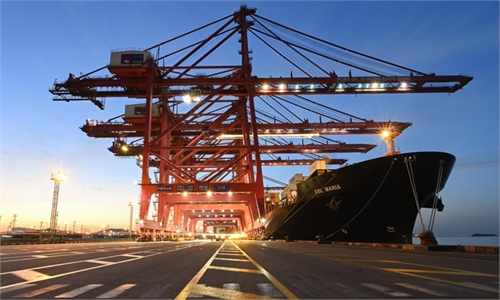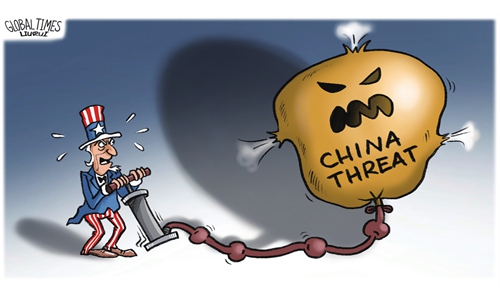US lawmakers probing ABB’s China operations is another case of politicizing normal business operation: experts

Cranes are busy around the clock handling containers at the Port of Qingdao, under Shandong Port Group Co (SPG), on February 11, 2023 to boost trade. SPG, a conglomerate based in East China’s Shandong Province, announced in January that it had handled 37 million standard containers, ranking third globally, with an annual increase of 8.7 percent. Photo: cnsphoto
Several US lawmakers have again invoked so-called security concerns to launch a probe into the Swedish-Swiss multinational engineering giant ABB Group's operations in China. Experts noted on Sunday that it is another typical case of US lawmakers politicizing normal business activities.
In the long run, it won't impact the pace of foreign investment flowing into China and their cooperation with the Chinese market players, experts said.
ABB’s operations in China are being scrutinized by two US congressional committees, according to media reports.
The main investigation focuses on Shanghai Zhenhua Heavy Industries Co, with ABB becoming involved because it’s a sub-supplier to the Chinese state-owned manufacturer of container cranes, Bloomberg reported on Friday, citing a letter from US Congress.
“ABB’s crane software technology is supplier-independent and installed on cranes manufactured by major crane builders including Chinese companies. These cranes are bought by US ports from Chinese and other companies, not from ABB,” the company said in a statement it sent to the Global Times on Saturday.
“We supply standardized electrical and automation software and hardware for cranes used in ports around the world, including the US,” it said.
ABB said it take the US Committees’ request seriously. “Since July 2023, ABB has been engaging with the (US) committees to respond to their requests with care. We are operating in line with all relevant US regulations and have provided timely responses,” the company stated.
This is not the first time the US has targeted cranes from China without any supporting evidence, experts said. In March 2023, US media outlets reported that some US officials are concerned that Chinese-made cranes operating at American ports could “give Beijing a possible spying tool.”
Chinese Foreign Ministry spokesperson Mao Ning responded during a press briefing that “the claim is entirely paranoia and meant to mislead American public.”
The core of the US investigations is a type of trade protectionism. It is entirely unrelated to global resource allocation and the so-called security risks, but politicization of normal economic activities, Hu Qimu, deputy secretary-general of the digital-real economies integration Forum 50, told the Global Times on Sunday.
Based on geopolitical considerations, the US hindrance to the optimal allocation of global resources will ultimately lead to growing production costs in the industrial chain worldwide. This not only hinders global economic recovery but will also backfire on the development of the US’ own industries, Hu said.
China, with enormous development potential, is a market that almost all multinational corporations cannot afford to lose, Hu said, adding the nature of capital is profit-driven and will not be swayed by political meddling, Hu noted.
ABB recently announced a three-year plan to invest $100 million in building a "net-zero carbon" smart manufacturing hub in China. The company expressed optimism about the significant business opportunities arising from China's energy transition, China Media Group reported on January 12.
Global Times


